

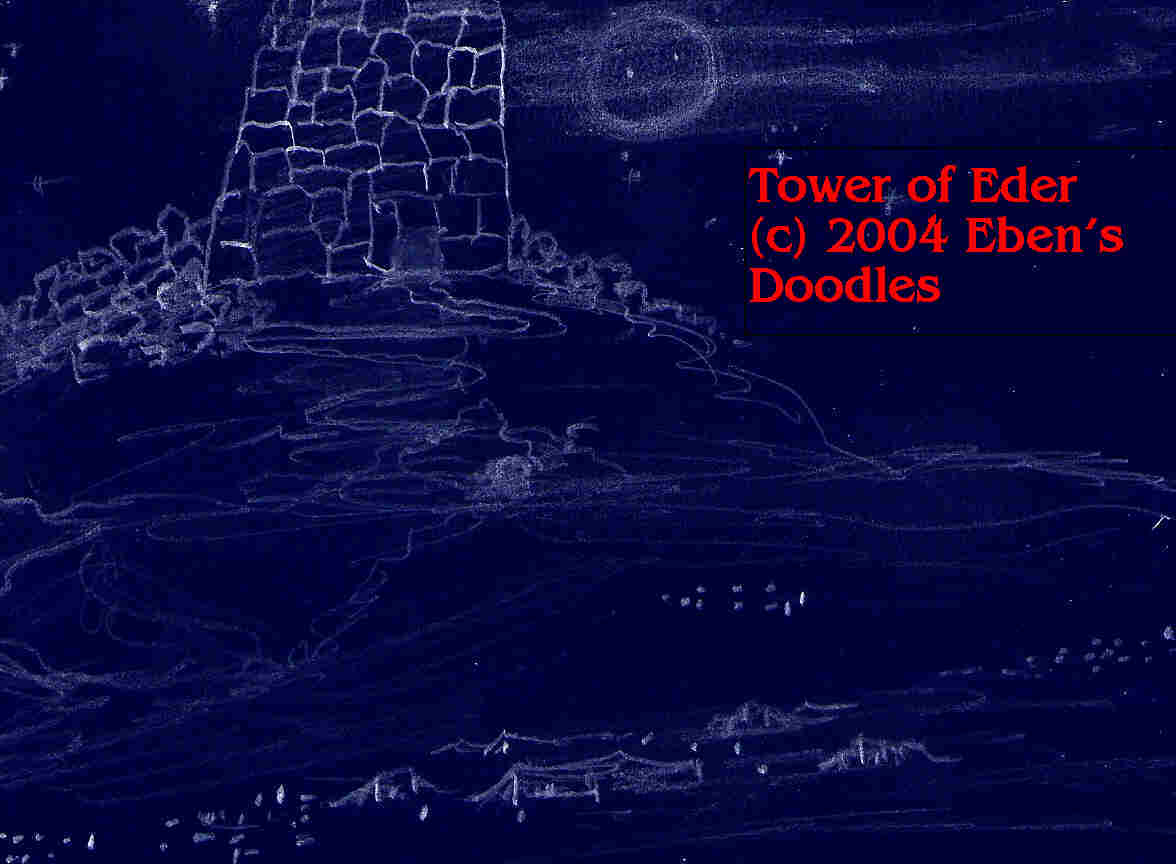
There was supposed to be an execution of the Messiah, but quite the opposite happened. Just when Pilate was to order the crucifixion of Jesus of Nazareth there occurred a complete break-down in communication. Everybody instantly began speaking different languages! As the people rushed about in confusion, the Messiah vanished where he had been standing between two infantrymen.
To assess the situation before it got further out of control, the red star dropped off Pontius Pilatus, then flew from one end of the Roman Empire to the other.
Everywhere, it was the same, from Jerusalem to Rome and Spain, Gaul to Britain’s Wall of Hadrian: total chaos, the people fleeing the cities, the looting and burning of buildings, the mutiny of the armies. Clearly, it was the end of Rome II and the rule of Caesar. And it was apparent by now that Rome could not be put back together. Whatever had struck Rome was fatal.
The breakup of order was so extensive that not even the provinces would survive. Since each person spoke his own unique language, there could be no communication. By necessity, it was every man for himself, with the loss of all law and order as a result.
Even Tiberius Caesar was useless. The red star found the dissolute, old despot in the palace kitchens at Capri, raging at hopelessly befuddled cooks who could neither understand each other nor take a simple order for an already late dinner from the emperor himself.
Still bright, bold, strong, fierce, and potent, the red star’s might and majesty were intact and knew it. Rome was finished but not its creator.
With nothing more to detain it, the red star left Earth and sped toward the center of the Universe.
After finishing its business there (which in turn would displace former resident of Earth and set them on a course back to the home planet), it could not resist another visit to Earth. Utilizing refugees from Rome, it organized society according to language of its own choosing and rebuilt towns and cities, countries and empires. But the chief seat of power was reserved, to a river and valley shaped like a cobra--Mizraim, the Land of Red and Black. It was there the red star awaited certain developments it knew must occur now that it had set up the right conditions.
They had reached the final stage of the Wargame, the “broad and sunny uplands” where the deciding campaigns were to be fought, but he was fully aware he could not afford to rest on his laurels. After all, virtually all the Milky Way Galaxy had been wiped out, which meant the Opposing Player had the power to wipe out 3C 295 any time it chose.
It was insane to think the planet and its inhabitants could survive another major move. And where could they re-locate? OP would just follow and they would all be back to Square One--except that his part in the Wargame would be over and the spoils go to OP by default.
As for the Bronze Age civilizations OP was concocting with a pathological lust for authentic detail, Wally viewed them with great forboding. What good could come of another revival of humanity on OP’s terms? Even if the Rome thing had ended in a draw, would the next play?
He flew through one country after another of OP’s nightmare retro-world. Everywhere he saw people working, eating, fighting, loving, all without the slightest consciousness that it had all been done before. Where could it lead? Wally wondered, though he knew very well the drift was backwards to the Stone Age and beyond. How futile! he thought. Wally looked about and wondered how he was going to get cooperation from people who might be of help to him in the Game. Yet all they seemed to be concerned about was food production and consumption, money, and propagating the race. As he saw the cultures of Patriarchal Times take shape, he felt utterly at sea.
“Why should OP recapitulate this particular era according to Dr. Pikkard’s timeline? What does it stand to gain? It must have learned something from what happened to the second Rome, though it isn’t supposed to learn anything from the past. I just don’t understand a sociopath--that’s my difficulty!”
Nevertheless, he felt drawn to one people in particular--the tribal Hebrews--a peculiar people who, in past ages, had been bound up in about everybody’s destiny. “How can I ever communicate with them?” he wondered, a thousand times if one in the coming days as he followed them through the wilderness from one camp to another, all the time gradually gaining on Migdol Eder, “Tower of the Flock.”--a place notorious for assignations for both animal and humans. A ruin for ages, nobody knew who had built it--as the stones were too big for people to imagine moving with human strength, though aided with the might of numerous oxen. It had always stood there, as long as human memory, it seemed--and ruin or not, it seemed to inspire the passions when lit with the light of the full moon.
But what did Wally know of human passions? Not that he cared about his lack in this area. “All they know is sheep and goats and blood feuds! And why are they always singing that silly song?” It was on everyone’s lips!--well, almost everyone’s.
Speaking words so tenderly, Jackass led her out of view.
"Where is this herb you speak of, Sir?" the Ewe inquired as they ran; in Wilderness he led forth her, away from sight of any man.
The Ewe, alarmed, spied Eder's mount...
As fortune or Providence would have it, after a dangerous rendevous with his brother Esau, who had once vowed to kill him for stealing his birthright, Jacob had camped in the shadow of Eder, a notorious, ruined tower in Ken'an's heartland. It was at Eder the crime of love occurred: the Patriarchal bed was to be defiled by Jacob's handmaid-wife and his eldest son.
Spring arrived to paint the roadsides and open fields with the tall, flaming scarlet of poppies. The color was everywhere, and it seemed to get even into the blood of men and women, imparting a passionate intensity nothing could restrain.
One day when the flocks of Jacob were rutting joyously before the water troughs of Eder, down in the shady cleft of rocks at the Tower's base, Reuben, Jacob's first-born son, encountered his father's attractive handmaid-wife, Bilhah.
Bilhah, her milch-goats dragging enormous udders through the wildflowers, was so intent on digging mandrakes she did not see him, even when his shadow fell across her.
Now the grotesque root of the mandrake sometimes resembles, some say, a man-child. Others imagine it resembles the root of a man. Possessing a powerful magic, the bitter tea of this herb of love was much prized by Jacob's women, all of whom were competing for first place in his bed in order to bear him the most children.
She was holding the precious weed in dirty fingers when the first-born seized her from behind. Of course, they knew better than to continue the matter there and so slipped into her nearby tent. There he bent her remaining misgivings more or less willingly to the ground--where, after passion was spent, they sprang up even stronger and thick-stemmed than ever, but by then it was too late. The illicit plant had sprouted, grown, and was producing fruit.
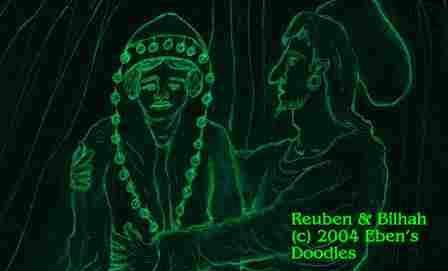
Not that there were no signs that something had happened. Bilhah, everyone noted, now acted as if she were a cut above the other handmaid-wife, Zilpah, who deeply resented the outrage.
Reuben showed no outward change, except for being a little more patronizing toward his younger brothers and half-brothers. He was now a man, his manner seemed to say to them, and they were something less--mere lads! They soon repaid his condescension with disrespect and outright abuse, which he dared not protest if he did not want to see the whole scandal made public.
“How dare they begrudge me what is really mine!” the first-born thought indignantly. After all, couldn’t they see he was just sampling what would be his after Father Jacob died? So why wait? Bilhah would only age and lose her charms if he waited any longer.
No, they couldn’t see. And from then on various brothers actively began jockeying for advantage and pleasure, even going so far as leaving the family fold and entering heathen households.


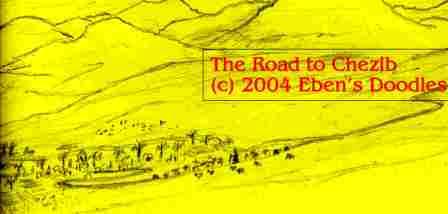
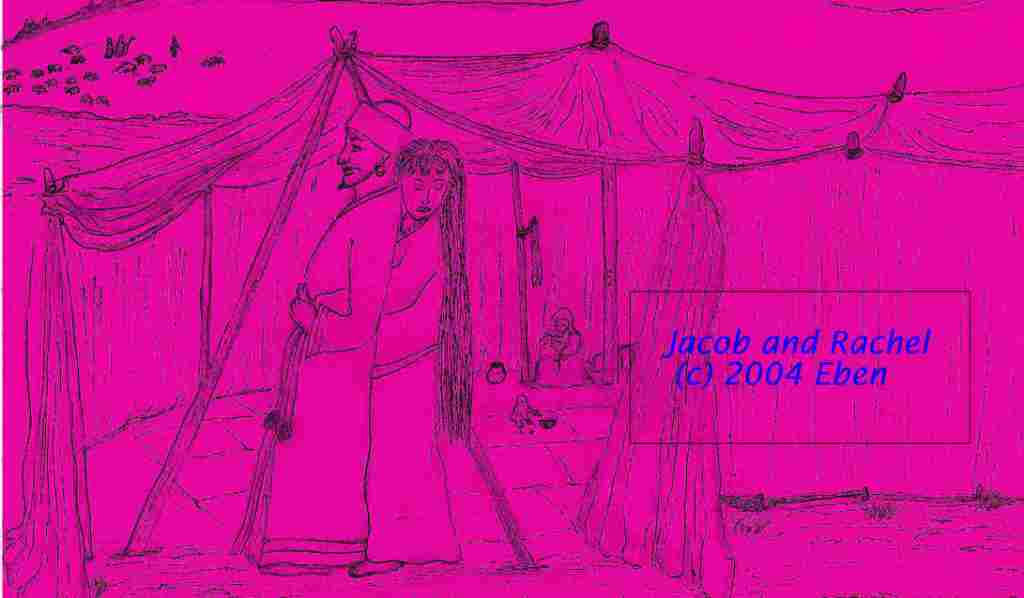
Sometime later Judah returned to his flock, drew on his robe and lay down. The woman’s embraces had proven her willing enough, but she was ugly and he had no mind to spend the rest of his life with her. Besides, she scratched his face too much for what she put out. He was still sleeping when the moon arose and wolves began to howl. Roused by the cool breezes that were running down through clefts of the rocks, Judah went over to the stream and washed his scratched face and drank deeply. He wanted somehow to wash off the woman’s kisses too, and the memory of red, grape-stained teeth already gone bad.
Looking about in the gathering dark, Judah decided to gather his flock into a makeshift fold for the night. He took his shepherd’s rod--a long club of Hebron oak for warding off bears, lions, leopards, and wolves--and stood vigil that night after his sheep were settled together, as best he could do it in such a place.
Putting the blame on the woman, he couldn’t stay awake, but there was no trouble, and in the morning he snatched an hour or two more of sleep and then set off in a rush with his flock to yet lower ground. As he hurried his sheep along, keeping an eye out for strays, Judah had much time to think. His thoughts returned again and again to the camp at Hebron, and all the unhappiness he had suffered.
Why then did he not wait to receive the handmaid’s favors when the old man was dead and out of the way?
Judah sighed. He wondered how Reuben could lower himself seeking the love of an aging concubine, though Rachel’s maid. He might have had a wife of his own to enjoy if he had only asked his father. Evidently, Reuben hated the thought of going up to distant Padan-Aram where Abba Jacob had found and married both Rachel and Leah. The girls there were uniformly ugly, with such long, drooping noses and bulging eyes--Rachel being the exception and Leah (his own mother) rather the rule.
Simeon and Levi, and later Zebulun and Issachar, had gone and taken their pick of cousins and seemed happy enough; yet Reuben wanted something better. He had seen Bilhah and liked her well enough to risk Jacob’s finding out. And Abba had found out, not more than a day or so after it happened in the meadow and again in Bilhah’s tent, just beyond the Tower of Eder in the mountains near Jebus.
Judah laughed outright, his laughter rebounding across the hillsides. He was thinking about the comic, guilty and terrified look Reuben got when his brothers began taunting him. Day after day they made sly references to a well-known tale of a bumbling jackass head over hooves in love with a coy, brainless ewe.
How the firstborn writhed in shame when once Gad and Asher put on hides of a donkey and a sheep and acted out the parts! It set the whole camp laughing each time they did it. Yet he was obliged to watch and cover up his mortification with a sickly grin, for otherwise he would be acknowledging his guilt before all.
Judah was still laughing when a man approached him on the widening road. They converged, son of Jacob and a son of Adullam, and bowed as they eyed each other’s frame and gear carefully.
The Adullamite chuckled. “Morning of fragrance! I heard your sweet laughter from afar and wanted so much to talk with you. I see you are a good-humored man too! Are all these yours, my son, or your master’s?”
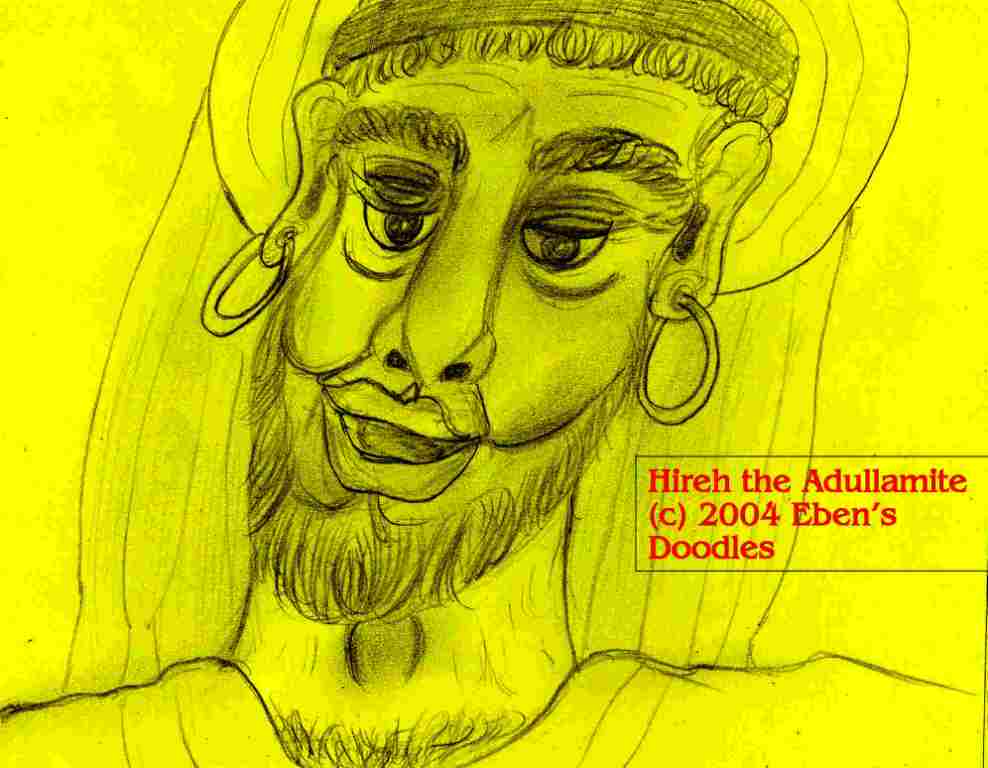
Nonplussed by the newcomer’s incivility, altogether friendly and outgoing, the Adullamite bowed again. “You are welcome to our land, poor as it is. As you can see, we have much pasture and few people hereabouts. Our dwellings are few in number and quite small. But come and remain here, and dwell with us. We have need of such sturdy-legged men as you since the greedy fish-god swam to our shores and began to devour the whole land. Yes, come and dine with me tonight at my house. My name is Chillelu-melech, but everybody calls me Hireh.”
The sociable overtures of the good-hearted Adullamite won Judah over. He had not expected to meet with a friend in the foreign land where he was headed; he had not known what he would find there. Now he had the good fortune to meet the very one who seemed to hold some authority in the district. Otherwise, how could he extend such a welcome, unless he were a food or playing him for a fool.
The man laughed at such a thought. He smiled broadly, showing teeth stained by grapes--many grapes. “If you think so ill of our hospitality, certainly you will change your mind when I give you one of my well-favored daughters, indeed, the fairest of the land.”
At the mention of women, Judah’s countenance softened immediately and lost its cold suspicion.
The Adullamite sighed and shook his well-combed head. “You see, my son, I have nothing but beautiful daughters since my good wife has failed to produce a son to my name. That is why I have gone out to the broad road day after day like this to seek someone who might be as a son to me. There is, you see, no such one as you in ripe manhood and prospects where we are going. My, those are weary sheep, my friend! You must not have much time where you came from.”
Judah let his exhausted, footsore flock graze for a time as he leaned on his staff and considered the man’s offer. Finally, he smiled, clapped the accommodating Adullamite’s shoulder hard with his hand, and together they set briskly off down the road to the Adullamite-Ken’anite “city” of Chezib.
“Please take some refreshment,” said Hireh, offering Judah soft, half-smashed grapes from a bag attached to his girdle.
“I won’t be staying long,” said Judah, but he took the bag.
Hireh nodded and rolled his eyes. “It’s a tiresome duty, but there seems to be nobody else who can do it here.”
Judah emptied the whole bag into his mouth and chewed noisely, spitting seed and some excess juice down his front. “Good grapes you have here!” he grunted.
“Yes, our vines are well-nourished and produce well, year after year.”
Really not more than a hamlet with a headman instead of a king, Chezib nestled in a tiny but lush valley in the western slopes. It was lovely there, all green with vineyards and olives, gardens and pigpens, though the somewhat lazy, easy-going ways of the people and the modest sizes of everything kept livings somewhat reduced. Chezib’s swine, when they weren’t strewing their droppings beneath the grapevines, foraged further up the valley along the sides of the rushing stream, the same that had led Judah to the swineherdess--one of Hireh’s daughters.
When Judah saw Chezib, he knew instantly it was the place he would have chosen, even without Headman Hireh’s fine offer. He wiped his grape-stained lips and beard with the hairy back of his hand as he peered about at the dwellings set in the shade of trees. “Now where is this peerless daughter of Jobab you spoke of?” the young man demanded as they stepped with bent head into Hireh’s dwelling.
Hireh laughed again, though a bit too loudly for the size of the room. He was a man of much good humor. “What’s the hurry?” he said, bowing. “All in good time, my young friend, all in good time!”
Finding plenty of willing shepherds, Judah left his sheep and went back to Hebron and acted as if nothing had happened. When asked about his sheep, he said he had found good permanent pasture and hirelings he could trust. Whenever he could slip away back to Chezib, however, he did so, and most of his brethren thought he was only going to see how his sheep were doing.



